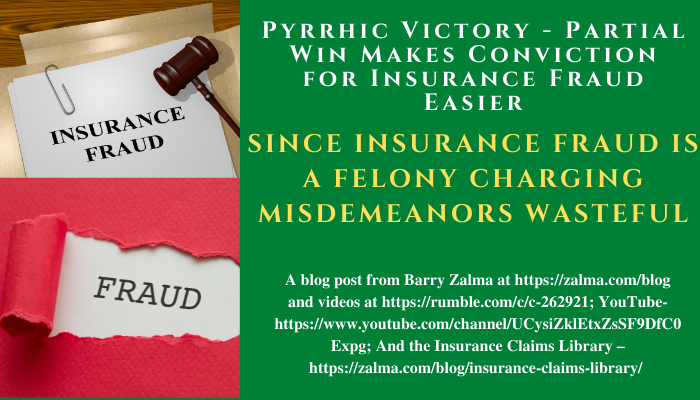-
News Feed
- EXPLORE
-
Pages
-
Groups
-
Events
-
Blogs
-
Marketplace
-
Offers
-
Jobs
-
Developers
Fraud Doesn't Pay

Since Insurance Fraud is a Felony Charging Misdemeanors Wasteful
Read the full article at https://www.linkedin.com/pulse/pyrrhic-victory-partial-win-makes-conviction-fraud-zalma-esq-cfe and at https://zalma.com/blog plus more than 4000 posts.
Following a preliminary hearing, Sanjoy Banerjee, a physician, was charged with two counts of presenting a false or fraudulent health care claim to an insurer, a form of insurance fraud and three counts of perjury. The superior court denied Banerjee’s motion to dismiss the information as unsupported by reasonable or probable cause and he sought a writ of prohibition to eliminate the charges. In Sanjoy Banerjee v. The Superior Court Of Riverside County, The People, Real Party in Interest, E076291, California Court of Appeals, Fourth District, Second Division (October 5, 2021) the Court of Appeals prohibited the perjury counts and allowed the insurance fraud charges to go forward.
INTRODUCTION
Banerjee petitioned for a writ of prohibition, directing the superior court to vacate its order denying his Penal Code section 995 motion and to issue an order setting aside the information. The People claim the evidence supports a strong suspicion that Banerjee committed two counts of insurance fraud and three counts of perjury.
Between 2014 and 2016, Banerjee billed a workers’ compensation insurer for services he rendered to patients through his professional corporation and through two other legal entities he owned and controlled. The insurance fraud charges are based on Banerjee’s 2014-2016 billings to the insurer through the two other entities. The perjury charges are based on three instances in which Banerjee signed doctor’s reports, certifying under penalty of perjury that he had not violated “section 139.3.”
BACKGROUND
The elements of the crime are (1) the knowing presentation of a false claim for payment of a health care benefit, (2) with the intent to defraud the recipient. Insurance fraud is a specific intent crime; the defendant must specifically intend to defraud a person with a false or fraudulent claim. The crime is complete upon the presentation of the claim, regardless of whether anyone is defrauded by or anything of value is taken or received in consideration for the claim.
ZALMA OPINION
The crime of insurance fraud is a simple, direct, crime to prove. If a fraudulent bill is sent to an insurance company the crime may be proved. Since the evidence showed that by using the two additional entities Banerjee was able to bill $9,000 more than if he billed it directly can cause a jury to conclude he issued the bills with the intent to defraud the insurer. The Court of Appeal, by eliminating the perjury charges made the case simple, clean and direct instead of complicating the trial with difficult to prove and less than clear statutes. Banerjee succeeded partially, and in so doing, made it easier for the state to convict him of insurance fraud.
We are 100% funded for October.
Thanks to everyone who helped out. 🥰
Xephula monthly operating expenses for 2024 - Server: $143/month - Backup Software: $6/month - Object Storage: $6/month - SMTP Service: $10/month - Stripe Processing Fees: ~$10/month - Total: $175/month
- Art
- Causes
- Crafts
- Crime
- Dance
- Drinks
- Film
- Finance
- Fitness
- Food
- Games
- Gardening
- Health
- Home
- Literature
- Music
- Networking
- Paranormal
- Other
- Politics
- History
- News
- Party
- Science
- Religion
- Shopping
- Sports
- SyFy
- Politically Incorrect
- Philosophy
- Theater
- Technology
- Wellness



